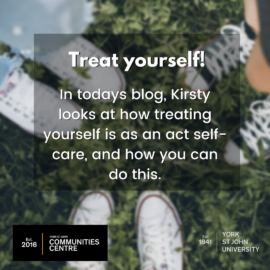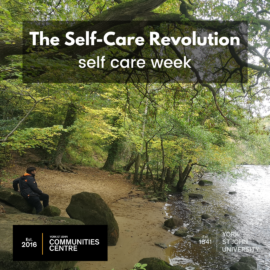October is Attention Deficit Hyperactivity Disorder (ADHD) awareness month, and today Kirsty, one of our amazing volunteer bloggers, is sharing their experience of ADHD.
My name is Kirsty and I have recently joined the blog team here at CMHC which I am super excited about! I have always had a passion for writing, so when this opportunity came up I jumped at the chance! I do have personal experience of mental health issues also, which I guess is a bit of an advantage when it comes to writing about it.
A bit about me…. I am a registered nurse and qualified 13 years ago. I have worked in a variety of settings dealing with both general adult nursing and mental health. I’m originally a York girl, however now live in Sherburn In Elmet ( so not too far away) with my family (My husband and two boys aged 4 and 6). I have a few hobbies, including photography, baking / cooking and crochet. However I have to say that I’m not brilliant at any of them! My main interest is reading, I just can’t get enough of it! Anyway, I hope you enjoy reading my work as much as I enjoy writing it.
This year’s theme of ADHD Awareness Month is ‘discovering new perspectives’. This got me thinking… Primarily ADHD is recognised as a neurodevelopmental condition impacting on behaviour, and this is usually the focus of treatment. However, the aim of this blog is to look at this from another perspective and highlight how ADHD co-exists with, and impacts on mental health.
Alongside the initial diagnosis, individuals may also battle with other mental health conditions. In fact, it is said that around 25-40% of adults with ADHD also suffer with anxiety [1]. And even more astonishing, up to 70% of adults diagnosed, experience and will be treated for depression at some stage of their life [2].
Although I have no official diagnosis (as of yet) I have been experiencing tendencies associated with ADHD, and in turn this has impacted my mental health. For years I have struggled with focus. I would say that I am an impulsive person, and if I get an idea in my head, well.. there’s no stopping me. Hobbies for example, I will start out with the enthusiasm and excitement that can only be compared to a kid in a candy shop. I throw money into each project, convincing myself that I NEED all of the best equipment immediately, and that this is going to be the best thing ever. Then what happens? I get bored. Can’t be bothered. Lose all enthusiasm. Then the vicious circle starts again. And in all honesty, this has been the same in my working life and career. Once the enthusiasm has gone, I feel down and depressed, berate myself for going through this whole thing time after time. But I just can’t stop myself. This has impacted me financially in the past, again further impacting my mental wellbeing.
Initially I had no idea why this was happening, leading to depressive episodes and increased anxiety. I have had people message me saying things like they had noticed me constantly moving from one thing to another, not putting my all into one thing before I would start another. I get easily distracted and this is constantly picked up at home too with simple chores like washing the dishes, not finishing them etc. Having those kinds of messages sent, and other people noticing and telling me, really affected my mood and motivation. I’m often left thinking ‘what is the point? I may as well do nothing, as I never finish anything anyway’. I was prescribed antidepressant medication, which seemed to work initially, but now I have that sinking feeling once more.
After working with a lot of people with ADHD and recognising / relating to the traits they were describing, I took an online assessment which suggested that I do have signs of ADHD. Now that I have recognised this, I decided that this is something I should try and get formal help with and possibly an official diagnosis. I recently raised the issue with my GP. And this is where I immediately hit a stumbling block. My GP was very quick to dismiss my concerns simply stating ‘This is an easy answer, you don’t have ADHD. You would not be able to function to the high standard you are (despite me telling him I’m not), and you would not have got to this age without being diagnosed’. However, it is known that due to poor awareness about ADHD in adults, it is common for clinicians and GP’s to not have awareness or knowledge around the subject. As a result of this often ADHD in adults is ignored or misdiagnosed as mental health conditions such as anxiety, depression, bipolar, borderline personality disorder or even dementia [3]. As described here my concerns (symptoms) were put down to my mental health, and therefore my medication increased. Which in fairness could be the case, although I feel to be dismissed so easily is extremely disheartening and could be very discouraging to people trying to seek help that is greatly needed. And of course this can have a further negative impact on mental wellbeing.
Where to access help and support?
If you recognise the issues described and feel that you can relate to them and need further support, there are a few places you can access help, advice and support.
Initially I would suggest speaking with your GP about any concerns you may have.
The ADHD Aware website has some really useful information also: Getting an NHS ADHD diagnosis.
The UK Adult ADHD Network also have a list of specialists in the UK Adult ADHD Service Map.
Another option is to pay privately for assessment also, and many private clinics offering this can be found online.
Similarly if you are struggling with mental health issues, you can contact your GP, or there are a wide number of local counselling services you can contact along with ourselves. Here at CMHC we can also offer support and a variety of services that are open to the York community.
____________________________
References:
1. National Resource Center on ADHD. (2008). What We Know: AD/HD and Coexisting Conditions: Depression. www.help4adhd.org/documents/WWK5c.pdf
2. National Resource Center on ADHD. (2008). What We Know: AD/HD and Coexisting Conditions: Depression. www.help4adhd.org/documents/WWK5c.pdf
3. ADHD aware (accessed 24/09/2021). Getting an NHS ADHD diagnosis. Getting an NHS ADHD diagnosis – ADHD Aware



